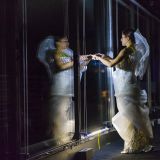
Rockaby
a Dance-Theatre-Performance after Samuel Beckett
about injuries and ageing
Nominated for the Kölner Tanzpreis 2015
15 + 16 December 2026, 8 pm, Orangerie Theater, Cologne
Rockaby - read by actress Anja Laïs (formerly Schauspiel Köln, now Deutsches Schauspielhaus Hamburg) and performed by Bibiana Jimenez (former soloists under Johann Kresnik) - is a short women's monologue about the eternal cycle of dying that Samuel Beckett wrote in 1980.
The title alludes to the name of a crude, humorous English children's song whose most popular version ends with a baby falling from a tree because the branch on which his cradle stood broke.
Rockaby shows a woman dying. She sits motionless in the rocking chair of her passed away mother, whose rocking motion always starts as if triggered by a ghost when she demands "more". Only her monotonous voice can be heard in the form of a rhythmic radio play, carried by the metre of the swinging chair, telling stories of her past and her dead mother. At the end of the piece, the swinging gradually comes to a rest, while the woman slowly lowers her head and dies. The eternal cycle of life and the hopelessness of the life situation are reflected in the strict form.
Rockaby is a short one-act play that Samuel Beckett wrote for the State University of New York in 1980. The wehrtheater/andrea bleikamp approaches the monologue on a sensual, physical level and tries to visualize and experience the text through the form of dance.
Director/Concept: Andrea Bleikamp
Dance/Choreography: Bibiana Jiménez
Voice: Anja Lais
Set: Claus Stump
Dramaturgy: Rosi Ulrich
Music: Timo Reuber
Light: Boris Kahnert
P+Ö: mechtild tellmann cultural management
PR: 11.1.2015, 20 h, KunstSalon, Cologne / 1.8.2015, Mallorca / 20.12.2018, Freihandelszone, Cologne / 25.2. 2019, 20 h, LABOR Projektgalerie, Cologne
8. and 9. November 2024, 8 pm, Orangerie Theater, Cologne
Trailer
Trailer from Frank Erler.
Critics
A freezing, beautiful, desperate body.
One climbs up stair after stair, after all, the Kölner Kunstsalon has event rooms in almost all formats. One is on the roof. A narrow, elongated room in which the chairs face outwards with their seats. One could almost flatten one's nose against the window pane.
A gesture that the evening will actually bring forth, but then a face will squeeze against the pane from the outside and you can see from the inside how the face changes grotesquely. These deformations are then already an expression of burning despair. In "Rockaby" Samuel Beckett locks up his heroine in an oppressively hopeless situation. Is she a heroine? Yes, she has what it takes to be a heroine, because she sweeps us away in her fight against death, and of course she loses it.
All the more heroic her rebellion. That sounds like pathos. Andrea Bleikamp, however, read Beckett well, this text that the Irishman wrote in 1980 as a kind of finger exercise for the State University of New York, which organized a symposium in his honour. It was the monologue of an old woman in a rocking chair, dressed in black. Andrea Bleikamp dresses her protagonist in a silvery-white robe, a little cocktail dress, a little wedding dress and on the outside the packaging material of a parcel. Pragmatic and valuable at the same time, a body that will soon be nothing more than a lethargic mass, but now it is still alive. Now it is still beating sparks of rebellion, despair and grace at intervals, just as the swinging puts things at a distance and brings them closer to us again.
Bibiana Jimenez, who belonged to Johann Kresnik's ensemble, plays this woman. An excellent cast, she combines beauty and maturity in her movements. By reversing the signs from which black turns into white, Bleikamp emphasizes the female aspect of the piece. Gender is fate, women die differently than men. And while with Beckett the movement remains reduced to the rocking chair, as it were everything happens within the language, Bleikamp and her team from the wehrtheater turn the subject around and let the despair dance.
Movement does not have to remain mute, but may be emptied. While Anja Lais speaks the text, Jimenez acts at dizzying heights above the roofs of Raderthal. The audience is very close to the drama of this dialogue and the dancer's body, which at first is still shivering. Only the glass is between us, who at every moment feel our role as voyeurs, and the fight behind the glass. This glass then also becomes a metaphor of powerlessness, like a fly stuck in a preserving glass, there will be no salvation for this woman. This is the abyss in every single life that Beckett so decisively measured. "Rockaby" presents itself as a strong production whose experience you take with you into everyday life. (Thomas Linden, Choises 02/15)
Wehrtheater impresses with new "Rockaby" production
Samuell Beckett's brilliant short play "Rockaby" is currently playing at the Wehrtheater in Cologne. By ignoring the author's precise instructions, director Andrea Bleikamp stages the play in her very own way - with success.
Instead of Godot, she waits for the end, all alone. In "Rockaby", one of Samuel Beckett's brilliant short pieces, a woman sits in a rocking chair in front of the window and is reflected in the glass. In the picture she also sees her mother, who had sat there until the rocking stopped and the breathing too.
The Cologne director Andrea Bleikamp of the Wehrtheater has now staged this brief, repetitive Beckett monologue from 1980 for a woman's voice from a band and a woman's body rocking in front of it on stage in an idiosyncratic way, ignoring the author's precise directional instructions. That has something.
The window, however, appears: a row of glass balcony doors on the top floor of the Kunstsalon that reveal a view of Cologne at night. In the distance, a skyscraper with a single, lonely, illuminated window. As ordered. The spectators here sit inside; Anja Laïs' whispering voice comes from somewhere, from the tape; Timo Reuber's cool electronic clouds of sound enlarge the library room into infinity.
The woman is outside: the dancer Bibiana Jimenez in a dress with glittering scales. She first keeps her distance from the glass, pricking her index fingers to the boundary between the rooms. She looks, stares, sees us or herself or both, goes up and down and squeezes closer and closer to the window, slips down, stands up. So she repeats movements like the much reduced Beckett lady.
She grimaces and tousles herself, a suffering woman, intensively embodied, but also something out of time. Unfortunately, the last joke is lost in the German translation when Beckett reinterprets the eternal rocking: "fuck life". (Melanie Suchy, Kölner Stadtanzeiger 01/15)






